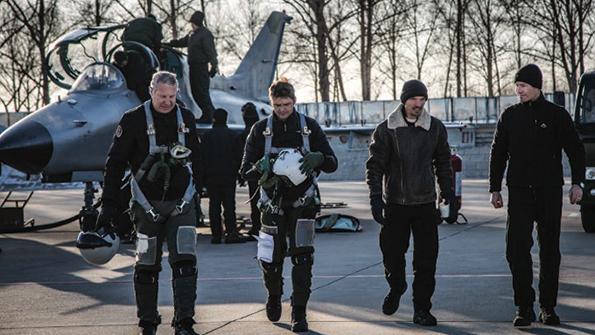
TFASA says it is the only independent test-pilot school outside Europe and the Americas.
On April 23, 2022, a Hongdu L-15/JL-10 jet trainer crashed in Anhui, China. Both pilots ejected from the aircraft safely, but what raised eyebrows was who was in the aircraft.
When villagers rushed to the scene, they videoed on their cellphones a Chinese pilot and, next to him, a non-Chinese pilot dressed in a sand-colored flight suit speaking in accented English.
The internet went abuzz with theories. Some said he was a Russian pilot working in conjunction with the Chinese on the L-15 aircraft project, and some suggested he was a test pilot from Serbia or Latin America, where China is hoping to market the aircraft.
Beijing never gave an explanation on the origin of the mysterious pilot.
- South African company helps place Western pilots in China
- Political indoctrination might affect Chinese pilots’ skills
Six months later, the UK government revealed that as many as 30 former British military pilots are in China providing training to the People’s Liberation Army (PLA). Since then, reports have suggested that China has also headhunted former Australian and French pilots for similar roles; French naval personnel are of particular interest because of their aircraft carrier experience.
A South African company, the Test Flying Academy of South Africa (TFASA), has been named as an intermediary for foreign pilots to work in China. It even advertises a four-year contract to work at an undisclosed location in “Far East Asia.” Job requirements state that pilots must be graduates of either a U.S. or UK military flight-test school.
An anonymous pilot in Australia tells Reuters that the company is “clearly targeting Western/Five Eyes test pilots,” the latter referring to Australia, Britain, Canada, New Zealand and the U.S. UK defense officials said the pilots are being offered “lucrative” pay packages worth more than £200,000 ($226,000) a year.
Following their UK counterparts, the Australian Defense Department has commenced an investigation to see if any ex-military pilots have been lured to China.
So what is TFASA? Formed in 2003, it states on its website that it is the only independent test pilot school outside Europe and the Americas. Its website sports numerous high-resolution photos of PLA aircraft—namely, the L-15, Shenyang J-16 and one image of an FTC-2000 with a group of Western pilots.
Jean Rossouw, a former test pilot with the South African Air Force (SAAF), is chairman of TFASA and a director of the China-linked Avic-International Flight Training Academy (AIFA). AIFA is a joint venture partner of TFASA. C. Jurie van Wyngaard, TFASA CEO, is also a SAAF pilot who previously held roles at Pilatus and Saab.
TFASA is also involved in aircraft sales for Blackshape Prime, Blackshape Gabriel and Ikarus C42 light aircraft.
Although the pace of the People’s Liberation Army Air Force’s (PLAAF) modernization has been quick, its tactics and operational concepts are not validated in any aspects. Countries such as Japan and South Korea are trained to Western standards, whereas India has combat experience against Pakistan, but the PLAAF remains untested. With the exception of a handful of exercises with Thailand and Turkey, Beijing has no benchmark for how its pilots and fighters will deal with potential foes.
Collin Koh, a research fellow at the Institute of Defense and Strategic Studies at the S. Rajaratnam School of International Studies in Singapore, says the current skills and tactics introduced by the foreign pilots could be hindered by existing PLAAF political indoctrination.
“In other words, Western and Western-inspired air forces tend not only to put more emphasis on the individual aptitude of the combat aviator but also give a wide berth of autonomy in decision-making,” Koh says.
“Given the extent of centralization and political control within the PLA, which we are seeing being strengthened under [Chinese President Xi Jinping], one should question whether inducting these new insights and skill sets from foreign instructors may make a significant difference in the way the PLAAF operates, unless there’s a monumental shift in the command and control as well as political indoctrination,” Koh continues.
UK officials say there is no evidence that pilots recruited to work in China have broken the Official Secrets Act, the UK’s primary law against espionage.
But since the government in London is taking a more hawkish line toward China, along with other European nations and the U.S., the UK’s Defense Ministry is considering what actions it can take to prevent military expertise from being transferred to potential adversary states in the future. In particular, the UK is looking at using confidentiality contracts and nondisclosure agreements to prevent such transfers of information. Meanwhile, a new National Security Bill currently being examined by lawmakers will create additional tools to tackle “contemporary security challenges,” officials say.
—With Tony Osborne in London





